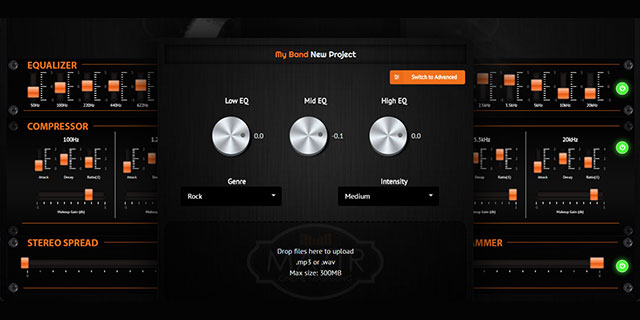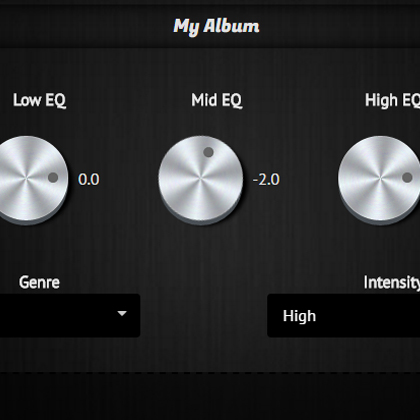 Mastering is the final step of audio post-production. The purpose of Mastering is to balance the sonic elements of a stereo mix and optimize playback across all systems and media formats. Traditionally, Mastering uses tools like equalization, compression, limiting and stereo enhancement. It is the final set of tweaks before the music is released.
Mastering is the final step of audio post-production. The purpose of Mastering is to balance the sonic elements of a stereo mix and optimize playback across all systems and media formats. Traditionally, Mastering uses tools like equalization, compression, limiting and stereo enhancement. It is the final set of tweaks before the music is released.
You may wonder how the two processes differ if you're not a mixing or mastering engineer. The technical details often confuse even experienced musicians, so few people besides the engineers know what happens during these final stages.
This confusion often leads to misinformation, with some people thinking the two processes are the same, or perhaps unnecessary.
Mixing starts the audio post-production process, where an engineer defines and balances the separate tracks in a session to sound good when played together. Using a range of tools such as equalization (EQ), compression, panning, and reverb, mix engineers reduce clashes between instruments, tighten grooves, and emphasize essential song elements. Sometimes they may even layer samples from another session or mute unnecessary sounds that don't work for the track.
Mastering completes the post-production process, enhancing the stereo mixdown by correcting and tuning the various sonic elements to ensure the best playback quality across all systems and formats before release. Using tools like compression, stereo width, limiters, maximizers, EQ, automation and more, Mastering is where the mix is perfected to make it sparkle. It is also the last chance to catch mistakes or change how a track sounds, ready for its final release format.
 Mastering can make your tracks or podcasts sparkle - more like the songs you hear on the radio. It is usually done as part of post-production. Most people hire a mastering engineer even if they record in a nice studio. Maztr makes this service instant and affordable.
Mastering can make your tracks or podcasts sparkle - more like the songs you hear on the radio. It is usually done as part of post-production. Most people hire a mastering engineer even if they record in a nice studio. Maztr makes this service instant and affordable.
If you think, "Why do I need someone else to fiddle with my final mix when the music sounds exactly the way I want it to sound?” here are some of the main reasons why Mastering is an essential and necessary process before music or podcasts are released.
One of the essential goals of Mastering is to make sure each track plays well across a wide range of playback devices and environments. It's not uncommon to be happy with a mix in the studio but find it boomy in the car or unacceptable on laptop speakers.
Optimization begins during mixing, but Mastering's intelligent tools and algorithms can help you discover and rectify problems that may not have been picked up earlier. After Mastering, you'll need to check your music and podcasts on a range of speaker and headphone systems at high and low volumes to get a feel for how they will sound in the real world. If you don't like something, Maztr makes it easy to remaster with new settings.
Different musicians and audiences can have varying preferences when considering loudness and dynamic range. The best masters are those with a song-to-song dynamic balance, not only within each project but also within their genre.
Classical and jazz musicians often prefer their masters to sound more natural, however this comes at the expense of loudness. Despite this, it's often preferred in the context of an album or particular audience. In fact, dynamic masters can actually have much more impact than loud masters if the Mixing and Mastering are done correctly. Alternatively, many pop and rock musicians prefer their masters loud, however this often leads to dynamic range and sonic compromises as the volume is pushed louder. These decisions are often a personal choice, and Maztr's wide range of settings allows you to experiment with the different options.
During recording, minor errors can sometimes slip through. Background noise, vocal or breathing sounds, pops and other noises can become more audible and noticeable at higher volumes. Alternatively, a recording artist may be happy with the original mix but may start to hear errors or become less comfortable over time.
Mastering can be the last line of defense against these problems. With today's technology and advanced algorithms, the range of possible repairs and adjustments can be surprising. Mastering can’t turn a bad mix into a good one, but you may be surprised at its effectiveness.
When mastering a group of tracks in a single project, it's often necessary to take a project-wide view of the music to create a balanced and unified album. Ideally, we need to look at how the various tracks work together rather than focusing on each track individually.
Many albums will have a few tracks that sound different from the rest. They may be softer or louder, brighter or darker, or recorded in different environments or with other equipment. Mastering allows many adjustments to the various settings to help these tracks work better together in an album. It can also adjust track spacing and sequence, perhaps adding slightly longer breaks between tracks where there is a sudden change of pace. In other words, mastering can help transform a collection of individual tracks into a balanced and unified album.
File formats will vary depending on the delivery platform you choose. A wide range of technologies is used to deliver music and podcasts to consumers - streaming services, digital downloads, CDs, tape and even vinyl is making a comeback. An essential part of the mastering process is preparing streaming and distribution-ready masters in the most common file formats for release, usually 16 or 24-bit HD WAVs.
Ultimately, Mastering simply makes mixes sound better. It uses tools like equalization, compression, limiting and stereo enhancement to reveal and enhance a level of polish, intensity and detail in your music that you may not have believed possible. As a result, Mastering gives you one last opportunity to make your music shine by adding clarity, tone, depth and punch.
Our Blog and Bookshop have loads more information about Mastering. Click the links to check them out!